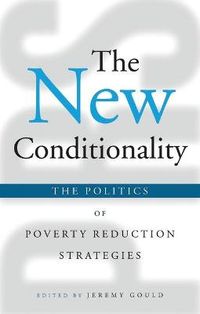
spara 58%
2 säljare
The New Conditionality Upplaga 4
Poverty Reduction Strategies (PRSs) are the new buzzwords in development aid. Some seventy developing countries have already elaborated a PRS in response to the requirements of the International Monetary Fund, the World Bank and bilateral aid agencies and as a precondition for rolling over past debts or obtaining new assistance. While it may be premature to reach conclusions as to their ultimate economic and social impacts, implications for local policy making and political processes, as this book explains, are already becoming clear. PRSs, as with the Structural Adjustment policies that they have ostensibly replaced, run up against a central paradox: in vesting decisive policymaking powers in external agencies, the very process of drawing up development strategies to prioritize reducing poverty can undermine the consolidation of democratic forces, structures and ideas in developing countries. While the nuanced conclusions of these field studies show that the political terrain and the specific impacts of PRSs in different countries are highly variegated, serious questions arise about the long-term political consequences of this new generation of contemporary development practices. (Bookdata)
Upplaga: 4e upplagan
Utgiven: 2005
ISBN: 9781842775233
Förlag: Zed Books Ltd
Format: Häftad
Språk: Engelska
Sidor: 192 st
Poverty Reduction Strategies (PRSs) are the new buzzwords in development aid. Some seventy developing countries have already elaborated a PRS in response to the requirements of the International Monetary Fund, the World Bank and bilateral aid agencies and as a precondition for rolling over past debts or obtaining new assistance. While it may be premature to reach conclusions as to their ultimate economic and social impacts, implications for local policy making and political processes, as this book explains, are already becoming clear. PRSs, as with the Structural Adjustment policies that they have ostensibly replaced, run up against a central paradox: in vesting decisive policymaking powers in external agencies, the very process of drawing up development strategies to prioritize reducing poverty can undermine the consolidation of democratic forces, structures and ideas in developing countries. While the nuanced conclusions of these field studies show that the political terrain and the specific impacts of PRSs in different countries are highly variegated, serious questions arise about the long-term political consequences of this new generation of contemporary development practices. (Bookdata)
Begagnad bok
259 kr606 krSpara 347 kr (58%) mot nypris
Fri frakt & skickas inom 1-3 vardagar
Köpskydd med Studentapan
Varje köp täcks av Studentapans köpskydd som säkerställer att boken kommer fram, att du får rätt bok och att skicket stämmer överens med beskrivning.



